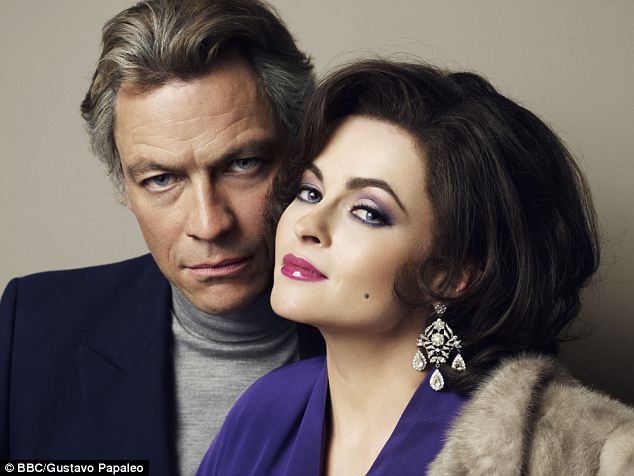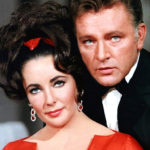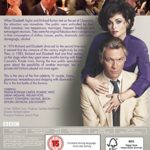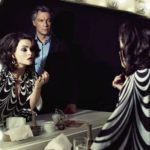“Where did my Antony go? Remember? The man who would’ve risked everything for me – who did! He tossed it all against the rocks so he could be with me. Where did he go, Richard? Tell me where my FUCKING Antony went!” – Elizabeth Taylor in Burton & Taylor
“She was unquestionably gorgeous…She was lavish. She had a dark unyielding largesse. She was, in short, too bloody much, and not only that, she was totally ignoring me” – Burton on Taylor after their first meeting.
“My first impression was that he was rather full of himself. I seem to remember that he never stopped talking, and I had given him the cold fish eye” – Taylor on Burton after their first meeting.
Making a film about two of the most charismatic and enigmatic film stars of the past century, namely the eponymous Richard Burton and Elizabeth Taylor, was asking for trouble, even without their stormy personal relationship – though the source material was so juicy that a biopic was utterly inevitable. The only surprise is that their story was not made into a mini-series, but credit to Richard Laxton for taking on the challenge.
Burton & Taylor assumes your prior knowledge of their careers, so for context please indulge me for a moment while I mention how these were two people marked out for stardom from an early age:
Taylor came to public attention in National Velvet at the age of 12, appeared run many films as an adolescent but set out her adult acting credentials in Cat On A Hot Tin Roof in 1958. She had stardom handed on a plate in the final days of the Hollywood star system, gained in part from her natural beauty and charisma in spite of several severe health issues.
The ruggedly handsome Burton, the elder of the two by 7 years, was shot to stardom in the 50s with The Desert Rats and especially The Robe, having served a long apprenticeship on the stage after an inauspicious spell in the Welsh coal mines. While equipped with a glorious baritone voice and haunting eyes, Burton’s acting credentials were readily apparent, even if some of the projects he accepted for an easy pay cheque were not worthy of his talent, though there is no doubt he could add a touch of genius to what might easily have been very ordinary movies. Take The Medusa Touch: you could barely take your eyes of Burton in a slightly laborious thriller about telekinesis, and devoted his full mesmeric power to the likes of Schaffer’s Equus.
But…. there’s no doubt that the best work either Burton or Taylor did was together, despite frantic tantrums and fraught emotions. They were never better than in the mega-movie of its day, Cleopatra (where they began a tempestuous affair while married to other people), or the curiously prophetic but undeniably brilliant Who’s Afraid Of Virginia Woolf. Together they wrought something exceptional from Dylan Thomas‘s masterpiece Under Milk Wood – despite never being on set at the same time. For all their individual fragility, they needed one another to make complete what was otherwise fragmentary and elusive.
So how do you convey such genius and a fractious love-hate relationship? In practice Burton & Taylor focuses on the episode with heavy hints to the past, to wit, Burton and Taylor reunited on Broadway in 1983 to play in Coward‘s Private Lives, two divorces down the line and the press baying for a third wedding between the pair. Both were recently divorced and Burton was dating Sally Hay, soon to be the 4th and final Mrs Burton (which marriage roughly half way through the film but remains unseen.)
Burton is portrayed as professional but with a slight chip on his shoulder about Taylor’s enduring love affair with the public at large; Taylor is shown as skittish, unprofessional and with a growing addiction to prescription pills and booze, occasioning a nervous breakdown and a spell in the Betty Ford clinic. Burton’s alcoholism, a major contributor to his early death, is skirted over.
To dramatise the battle of the egos, people truly larger than life requires actors of substance. In this case Helena Bonham Carter and Dominic West fill the boots of Liz and Richard, respectively. Critics and viewers took a fond and glowing perspective of the brief encounter, their last work together, and praised both their performances and chemistry:
Alex Hardy of The Times labelling the drama as “perfect” and added of Bonham Carter’s performance as Taylor, “(she) conducted the world around her in a sing-song voice that moved octaves within one phrase, the fragile sliding into the manipulative”.
Sam Wollaston of The Guardian wrote “Bonham Carter and West are excellent. There’s a crackle between them… They become two people who clearly are and always will be in love, but can never be together, for reasons of health and safety. It is another very good double act”
For my part I’ll say that the pair put on a touch of razzle-dazzle dazzle and a halfway decent mimicking, not unlike a pair of old Music Hall hoofers in their twilight years. Unlike my friend Mr Wollaston, I think there is an intangible quality missing, as inevitably it would be, the word being “magic.” This is important, since the whole point of the film is to demonstrate that beneath the barbs and battle lines there is still an enduring passion, concluding in the final scene with a somewhat unlikely outbreak of bonhomie and laughter. It seems out of character from all that has gone before, the reason being that the previous 79 minutes fail to convey the passion.
William Ivory’s script does try hard to articulate the paradox of their mutual ardour though. This is conveyed through several exchanges, though I like this one from an encounter between Burton and Ms Taylor’s assistant:
Richard Burton: What’s going on? Elizabeth!
Chen Sam: Leave her. She’s poorly. We’re getting her straight back to the apartment.
Richard Burton: There’s nothing wrong with her.
Chen Sam: She’s sick.
Richard Burton: Really? Well if she is, take it from one who knows: she’s got it from a bloody bottle!
Chen Sam: Can you blame her? You treat her like shit! She finds out you’re married from a newspaper article; you criticize her as an actress…
Richard Burton: What?
Chen Sam: You!
Richard Burton: I have NEVER criticized her as an actress, she is PEERLESS as an actress. Jesus! [pause] You call that acting, out there? It’s like a bloody pantomime dame tripping over all her lines – I know she can act, I know better than anyone! Which is why I’m not gonna TOLERATE that any more!
Chen Sam: In which case, maybe you’ll leave her alone once and for all. Because Miss Taylor was fine until you took this job; she was well until you decided to come back into her life again. Now why you did that, only you can know for sure, but from here, it looks like it was for one reason only: to break her heart.
[Richard is left broken and reeling from these words]
By comparison, Taylor’s relationship with her assistant seems equally fraught:
Elizabeth Taylor: [in a car after her nervous breakdown] What did he say? Did he ask if I was alright?
Chen Sam: He didn’t say much. But I told him, I think it’s disgusting the way he treats you.
Elizabeth Taylor: [stunned] You said what? [pause] Get out. [the car stops] Get out… I said GET OUT. GET OUT! Get the fuck outta here! [ushers her out of the car, then buries her head in her hands, sobbing]
Elizabeth Taylor: Chen… Chen! [Chen re-enters the car, and Elizabeth cries into her lap]
There is something forced and manipulative about the script, since it self-consciously fictionalises for dramatic effect something that for the most part went unspoken – the twinkle in the eyes of the film’s subjects. You can’t escape the conceit and artifice, no matter how proficiently it is achieve – but then that is one inevitable side-effect of this kind of venture, so there is an extent to which is comes across as mechanical – biopic by numbers if you will.
Whether it could have been done any better is a different question – quite possibly not, or rather maybe as an epic going through their peak years – though in my humble opinion the best way to get to know Burton and Taylor is to see their movies together. If you don’t get the full story from WAOVW you’ll never get it anywhere.









